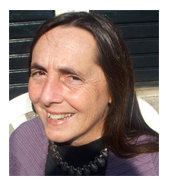Papa Christo Talks Shop
- Details
- Category: Interviews
- Published on Tuesday, 03 August 2010 22:08
- Written by Dianne Lawrence
Adorning the walls of the popular Papa Cristo’s Greek Restaurant are pictures from the 1948 grand opening of what was then just a simple Greek market.
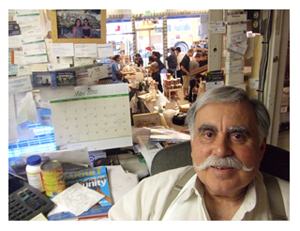 Sam Chrys opened C & K Importing Company, with the intention of bringing the foods and wines of Greece to Los Angeles. In 1968, Sam’s son and now the current owner, Chrys Chrys, purchased the business from his father to carry on the legacy and continues to import fine products from Greece like meats, seasonings, cheeses, olive oils, and other culturally true products.
Sam Chrys opened C & K Importing Company, with the intention of bringing the foods and wines of Greece to Los Angeles. In 1968, Sam’s son and now the current owner, Chrys Chrys, purchased the business from his father to carry on the legacy and continues to import fine products from Greece like meats, seasonings, cheeses, olive oils, and other culturally true products.
In 1985, Chrys wanted to create the feeling of the famous Greek taverna in the middle of the wholesale meat market in Athens. He bought the adjacent property, and opened a small kitchen with 12 seats. Since then he has purchased the 2 buildings on either side and opened a dining room with seating capacity for 100 and a delightful sunny patio/garden. His ability to create old world hospitality, that feeling of welcome and comfort, along with incredibly delicious traditional Greek food, makes Papa Christo’s one of L.A.’s premier Greek restaurants and a favored destination. It’s reputation extends as far as the east coast and Greece itself.
As new businesses and restaurants start to populate the Mid-City landscape I thought I’d interview Chrys who runs a friendly but tight ship. How has he survived? What advice can he give to new struggling business? The interview revealed a caring and attentive businessman who never rests on his laurels.
TNN: Were you always convinced this was the kind of business you wanted to run?
Chrys: There was a time when I needed to make up my mind about what direction I wanted to go. Did I want to become a store that sold Frito’s, shoelaces, chips etc.? No, I decided I only wanted to sell imported Greek food indigenous to the middle east, the Balkans and to Greece.
TNN: What were some of the biggest changes you’ve made to adjust your business to the changing landscape?
Chrys: We had to change things several times. When a middle eastern contingent moved in we carried those items which were often the same as the Greek items but with different names. Then we had Turkish people, then Italian people. This neighborhood is constantly changing. It was Mexican and now it’s becoming Korean and Salvadorian. When my father moved in it was Japanese but he started this place because he knew the Greek church, St. Sophia, was to be built across the street so he knew it was a good opportunity.
TNN: What was one of the smartest business decisions you’ve made over the years. When you look back you can say “I’m so glad I….”?
Chrys: I’m so glad I opened Papa Christo’s Taverna. The restaurant did more than just add foot traffic. It offered an opportunity to be creative and being creative is the part that brings out your best. You don’t compete with others, you compete with yourself. If you come to work everyday with the idea that you are going to bring something new, do something better, if you come in with the attitude that you are going to elevate your business in any way, little, big, doesn’t make a difference, then you will have a good day. So, all of us here try to come in and have a better day today.
TNN: And what’s the worse decision you ever made?
Chrys: That I didn’t start the restaurant earlier! (laughter) I don’t think there have been any bad decisions. But it would have been great to have opened the restaurant earlier. It’s given people more reason to come here. Come for a little Greek coffee and some sweets. Buy some spices, bread, cheese, meat. Have a meal. Everyone is welcome!
TNN: You’ve succeeded in that. It’s so much fun to come here. You get free samples, buy some baguettes, olives. And the Greek coffee is amazing!
Chrys: And when you get greeted by someone here, its real. It’s not just someone doing what they’ve been told to do. One of the things that irks me in other restaurants is some kid walks by and asks “how’s it tasting?” They aren’t taking the whole experience into account. They aren’t asking if everything was enjoyable. We ask “is everything okay? Are you enjoying yourself?” We try to convey real care and concern for the customer.
TNN: So we have new restaurants opening up in our community. What are the kinds of mistakes they want to avoid making?
Chrys: I don’t know if mistake is the right word. Anyone opening up a new business is a brave young person. An entrepreneur. They should be applauded for taking a step and opening something. But that being said they have to understand what the need for their product is. They have to figure out what their role is and do the research. Are they going to be a convenience, a destination?
TNN: What’s the difference?
Chrys: A convenience is like 711. I’m a destination. If I didn’t have a parking lot I wouldn’t have customers because they come from far away. Downtown, Century City, Beverly Hills, Orange County. A new business has to figure out what their message is and make sure the whole experience works. You also can’t be too far from a freeway if you want to be a destination.
TNN: Tell me more about creating a destination business.
Chrys: A destination isn’t created overnight, it’s created over years. You have to be funded and you have to pay your dues
so persistence is important. You have to market and recreate yourself in your marketing. You can’t stay with one style. You need to expand your marketing agenda and probe to find out what’s going to bring in new customers. And when you bring in new customers are they enjoying the experience enough to bring someone else? You have to regenerate the people that do come. Use incentive plans to bring them back if they’ve enjoyed your place. Getting them in the door is one thing getting them to come back is another. If you can do that you are on the road to being successful.
TNN: It’s difficult to sustain a business.
Chrys: It’s much harder to stay in business than to open a business. Offer more than you expect to receive. I’ve never come into the store expecting to make any kind of money. I come in hoping to do a really good job and if I do, something will be left over.
TNN: Talk about the people you work with.
Chrys: We have a very strong family ethic. We hire people who use “please”, “thank you”, no “hey you”. We talk to each other by name. The biggest word in the English language is respect. We respect each other and the people who come in. We respect the fact that they come out of their way to come here. Respect. Respect. Respect. We don’t take anyone for granted.
TNN: How do you handle a complaining customer.
Chrys: The only money you lose is the customer who doesn’t come back. The customer who complains is your friend. The customer who walks out and doesn’t say anything isn’t helping you. But if a customer says “this is what I’d like to see” listen to him. He may like everything else but this one percent is bothering him. Let your customer interact with you.
TNN: Any other tips?
Chrys: Keep the place clean. Very important. People don’t want to eat in a place that’s below their standards.
TNN: What are some of the danger signals for a business? At what point do you have to become alert to potential disaster?
Chrys: Overconfidence is as bad as it can get. I think you wake up every morning scared. If you think you’ve done a great job and done everything you can do…that’s dangerous. You have to be open to checking every part of your business. You can’t conquer the world overnight.
TNN: What is your definition of a successful business?
Chrys: One that makes you happy. There is no such thing as dollars and cents making you happy. You will never get enough wealth. If you only work for money I think you are not a successful person. If you work with pride and at the end of the night your feet hurt, your back hurts, your head hurts and your workers and customers are happy, that’s Perfect! That’s as good as it gets. That means you did your very best that day. And if you walk out and you’re not tired and your feet and back don’t hurt and you didn’t talk to a lot of people then you probably didn’t do a very good job that day. If you work and you’re happy doing it, it’s the right thing. Work is good. Labor is not good.
TNN: Any last words of wisdom for our new businesses?
Chrys: You need to accommodate your community, sell something you are proud of and believe in what you do.
Running A Medical Marijuana Collective
- Details
- Category: Interviews
- Published on Sunday, 04 April 2010 04:29
- Written by Dianne Lawrence
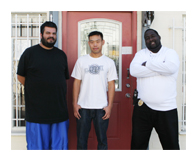
Interview with Daniel Sung, Director of LA Wonderland Caregivers
A Little Background: In November of 1996, California voters passed the Compassionate Use Act of 1996 or Proposition 215 with 55.6% of the vote. It allowed patients to use marijuana to alleviate the symptoms of a variety of ailments from cancer and Aids to sleeplessness and chronic pain.
Anthony Nicholas Remembers Rosa Parks
- Details
- Category: Leaders, Activists
- Published on Wednesday, 24 February 2016 15:29
- Written by World Tribune
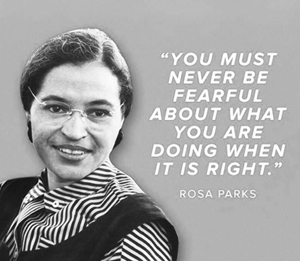 This article is reprinted with permission from the World Tribune. For more information on that publication, visit www.sgi-usa.org.
This article is reprinted with permission from the World Tribune. For more information on that publication, visit www.sgi-usa.org.Tony Nicholas, director of the Tom Bradley Family Source Center in Los Angeles, spoke on Oct. 4 at the SGI-USA World Culture Center in Santa Monica, California. Mr. Nicholas shared his recollections of the two meetings between his dear family friend Rosa Parks and SGI President Ikeda. The World Tribune sat down with him to discuss those encounters as well as other memories from his extraordinary life.
Nicholas: When I was 8 years old my mother remarried a lawyer named Leo Branton Jr. He was the first African American entertainment attorney in the 1950s. His clients included Nat King Cole, Dorothy Dandridge, Lena Horne, Miles Davis and Richard Pryor.
Later, he got more involved in the U.S. Civil Rights Movement and traveled throughout the South. When Dr. Martin Luther King Jr. and other civil rights leaders would get arrested, my stepfather would be the one to get them out. I was able to travel with him and meet both Dr. King and Rosa Parks.
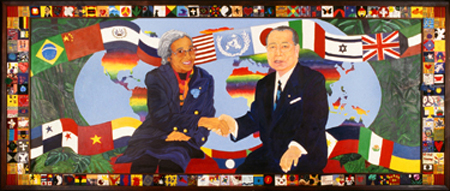 WT: Rosa Parks is revered throughout the world for refusing to give up her bus seat to a white passenger in Montgomery, Alabama, on Dec. 1, 1955. Mrs. Parks’ resistance and the Montgomery Bus Boycott that followed became important catalysts for the Civil Rights Movement. We understand that Mrs. Parks was a close family friend. What was she like?
WT: Rosa Parks is revered throughout the world for refusing to give up her bus seat to a white passenger in Montgomery, Alabama, on Dec. 1, 1955. Mrs. Parks’ resistance and the Montgomery Bus Boycott that followed became important catalysts for the Civil Rights Movement. We understand that Mrs. Parks was a close family friend. What was she like?Nicholas: Although presidents, kings and queens held Mrs. Parks in high esteem, and the people saw her as an icon, she remained such a humble woman. I learned from her to treat all people with compassion, and it’s something that I’ve carried into my own life as the director of the Tom Bradley Family Source Center. Every person who walks into my community center, whether it be the mayor of the city or a homeless individual, will get the same treatment. I learned this from Mrs. Parks.
Years later, my stepfather invited Mrs. Parks to stay in Los Angeles for six months out of the year to escape the cold in Detroit. So for 10 years, Mrs. Parks stayed at my family’s home in Los Angeles during the cold months. Every time I would go home, there was Rosa Parks, sitting on the couch drinking a cup of tea.
WT: What is your favorite memory of her?
Nicholas: I have many, but one time, when my daughter Nicole was in the first grade, we came over to my parents’ house to watch football. Nicole had a history report due, and she had to learn this poem about Rosa Parks. I went into the kitchen for a glass of water and saw Mrs. Parks patiently teaching my daughter a poem about herself. I’ll never forget that moment.
WT: You introduced Mrs. Parks to the SGI and President Ikeda. How did that come about?
Nicholas: My longtime friend Joe Perez first taught me about the philosophy and history of the SGI and Dr. Ikeda. He shared that Dr. Ikeda was an admirer of Dr. King and Mrs. Parks for their fight for the civil rights of African Americans.
On Jan. 30, 1993, Joe and I brought Mrs. Parks to the [former] campus of Soka University of America [in Calabasas, California] to meet Dr. Ikeda.
WT: What was your impression of their first meeting?
Nicholas: I will never forget it. When Dr. Ikeda arrived, he very humbly greeted each person. The first thing that struck me was his presence. Although he’s not a tall man, I felt like I was with a giant! Then, the two sat down and began to talk as if they had been friends for decades. I thought: My God, these two icons, who are so admired all over the world, are coming together. What an inspirational moment for the whole world. They talked about world peace and the youth of the world. They wanted to ensure that we stop all the violence and come together as people.
WT: We understand that many of those who knew Mrs. Parks were surprised that she accepted President Ikeda’s invitation to visit Japan, given that she had never traveled farther than America’s immediate neighbors.
Nicholas: She didn’t like t o travel overseas, but she felt so humbled by the fact that Dr. Ikeda had invited her and was going to bestow her with an honorary doctorate [from Soka University, which he founded]. I accompanied Mrs. Parks to Japan in May 1994.
WT: What was the trip like?
Nicholas: I will never forget the moment when we went to Soka University, where Mrs. Parks was to receive an honorary doctorate degree. We walked up to the stage of the auditorium, and the faculty was there with us. I looked around and thought it was just us.
Lo and behold, the curtains opened and there were thousands of Soka University students. We had no idea they were there because they were so quiet; I was amazed by that. Then they all stood up, crossed their arms and linked hands, as we did in the Civil Rights Movement, and started singing “We Shall Overcome” in English. What a moving moment; I cried and Mrs. Parks cried. Everyone was so moved.
Later, as we got in our cars and left the campus, all the students were lined up on both sides of the road. As the car passed, the students bowed. Their deep reverence and respect is something I attribute to the teachings of Dr. Ikeda. I will never forget that. We were treated like royalty. It was certainly quite an experience.
WT: In the book Talking Pictures: People Speak About the Photographs That Speak to Them, Rosa Parks chose a photograph from her meeting with President Ikeda in 1993 as one of the most important moments in her life.
Nicholas: When I would see Mrs. Parks toward the end of her life, of all her encounters, she would recall her encounters with Dr. Ikeda. She talked so fondly of Dr. Ikeda and the impression he left on her. She said he was unlike any other leader she had met. That was quite something. I certainly feel the same way about the effect he had on me.
WT: As someone who has also committed your life to serving others, what message would you like to impart to today’s youth?
Nicholas: I’ve had the honor of knowing and working with Rosa Parks, Dr. King and meeting Dr. Ikeda. These icons were willing to give their lives for the cause of freedom and peace. Young people should look within themselves and understand the shoulders that we are all standing on. We have got to be more tolerant, and we have got to understand the importance of healing and caring in a way that makes life better for us all.
WT: In an essay President Ikeda wrote about Mrs. Parks, he said: “Mrs. Parks related that it was her mother who raised her to be strong: ‘My mother taught me self-respect. She always insisted, There is no law that people have to suffer.’ ” Would you like to share any parting thoughts about your own mother?
Nicholas: My biological father and my stepfather were two great men, icons. But who was the driving force behind their careers? It was my mother. I hold women in such high esteem because of my mother, my wife, my two daughters and my grandchildren. I’m fearful of the kind of world that I’m going to leave behind for them. I believe we’ve got to do all that we can for world peace. We’ve got to come together.
Interview with Laura Meyers
- Details
- Category: Interviews
- Published on Wednesday, 03 February 2010 22:16
- Written by Dianne Lawrence
If you have participated in our community in any meaningful way then you probably know Laura Meyers.
Noted for her prodigious knowledge of all things related to local development, Laura is recognized as a fair and steady voice at meetings she attends or chairs, as well as for her tendency to be a little wonkish with the details. But you can hardly blame her. She has been at it for a long time and knows her stuff.
Ms. Meyers has held the position of Chair of the Zoning and Planning Committee on the United Neighborhoods Neighborhood Council (UNNC) since 2003 and has also been sitting on one of the project area advisory committees of the California Redevelopment Agency (CRA) for 20 years. Her involvement with community planning issues began in 1983 as one of the founding members of the West Adams Heritage Foundation. WAHA was originally established for historic preservation advocacy but within a few years it soon became apparent that preservation issues went hand in glove with zoning and development.
Preservationista Laura Meyers Wins Coveted Martin Weil Award
- Details
- Category: Leaders, Activists
- Published on Thursday, 04 July 2013 12:27
- Written by D.V. Lawrence
Laura Meyers is a dedicated, effective and passionate preserver of West Adams architectural heritage.
On May 5 at the Annual West Adams Heritage Association (WAHA) Preservation Brunch, she was recognized for her untiring efforts to defend against the encroachment of unenlightened development, to maintain the historic, architectural integrity in West Adams and to keep ongoing awareness of these issues front and center in the community by being awarded the Martin Weil Award. Martin Weil, who passed in 2009, was a local luminary in the world of preservation. Among his numerous accomplishments, he was a founding member of the Los Angeles Conservancy and a member of WAHA. WAHA created the award to honor Weil, making him the first recipient while he was still alive. It now honors the local heroes and heroines of preservation.
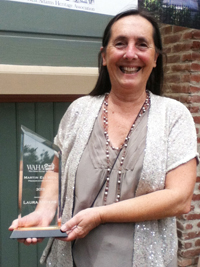 Laura has been a prime instigator and/or partner in getting 21 local buildings awarded Historical Cultural Monument (HCM) status. The South Seas House on Arlington below the 10 Freeway was referred to as the Witch’s House for many years because of its crumbling roof and ragged peaked gables and dilapidated exterior. It was headed for demolition before Laura and others stepped in, found the money and team for construction and began to plan the rehab. Councilman Nate Holden and members of the Council District 10 office stepped up, found over a million dollars to help restore it, and the house opened as a community resource for Parks and Recreation in 2003.
Laura has been a prime instigator and/or partner in getting 21 local buildings awarded Historical Cultural Monument (HCM) status. The South Seas House on Arlington below the 10 Freeway was referred to as the Witch’s House for many years because of its crumbling roof and ragged peaked gables and dilapidated exterior. It was headed for demolition before Laura and others stepped in, found the money and team for construction and began to plan the rehab. Councilman Nate Holden and members of the Council District 10 office stepped up, found over a million dollars to help restore it, and the house opened as a community resource for Parks and Recreation in 2003.
Laura is especially interested in the rich African-American history embedded in almost every neighborhood in West Adams. She coordinated the research, writing and editing of WAHA’s “West Adams Landmarks of African- American History,” which tells the stories of nearly 150 local sites associated with black history and personages.
One of her most beloved projects is the annual Living History Tour which takes place in the Angelus Rosedale Cemetery, one of the oldest cemetaries in Los Angeles, located on Washington and Normandie. As one of the WAHA coordinators of the event, she is tasked with researching the historic people buried there, finding actors to play them and writing the monologues about their lives. Audiences hike through the beautiful cemetery as the tour guide points out special graveyard features while directing them to the various gravesites where costumed actors deliver their historic story. It is one of the favorite community events of the year.
To read more about the different Living History Tour events, CLICK HERE .
More Articles...
Yesterday9
Week15
Month34
All988076
Currently are 99 guests and no members online
Kubik-Rubik Joomla! Extensions




